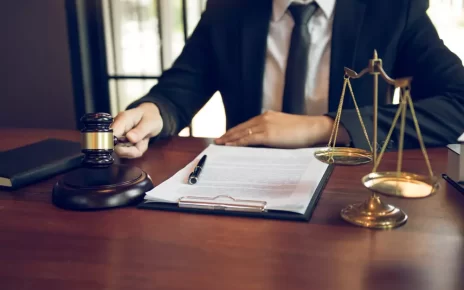Navigating the aftermath of a personal injury can be daunting. Whether it’s due to a car accident, a slip at the workplace, or an unfortunate motorcycle mishap, the path to compensation is fraught with legal complexities. This comprehensive guide, brought to you by insights from a seasoned personal injury attorney, aims to demystify the process, offering clarity and support to those seeking justice.
Understanding Personal Injury Claims
Personal injury claims are legal disputes that arise when one person suffers harm from an accident or injury, and someone else might be legally responsible for that harm. The responsible person’s insurance company typically pays the injured person for medical bills, pain and suffering, and other ongoing medical expenses.
Types of Personal Injury Cases
- Car Accidents: The most common form of personal injury claims where victims seek a car accident attorney to recover damages.
- Slip and Falls: These cases involve injuries sustained on someone else’s property due to unsafe conditions.
- Medical Malpractice: When healthcare professionals fail to provide competent care, leading to patient harm.
- Workplace Injuries: Injuries sustained at work or occupational diseases that require legal action outside of Workers’ Compensation claims.
- Product Liability: Involves injuries caused by defective products.
- Motorcycle Accidents: Specific cases where victims might need a specialized motorcycle accident attorney due to the unique aspects of motorcycle law and injuries.
Critical Elements of a Claim
- Duty of Care: Establishing that the defendant owed a legal duty to the plaintiff.
- Breach of Duty: Showing that the defendant failed to meet their duty of care.
- Causation: Proving that the defendant’s breach caused the injury.
- Damages: Documenting the losses suffered by the plaintiff due to the injury.
Steps to Take After an Injury
Immediate Actions
- Seek Medical Attention: Your health is paramount. Immediate medical documentation is also crucial for your claim.
- Report the Incident: Reporting the incident is vital for legal purposes, whether it’s a car crash or an on-the-job injury.
- Document Everything: Take photos, gather witness statements, and keep a detailed record of your injuries and any property damage.
Consulting with an Attorney
Engaging with a personal injury attorney early can significantly impact the outcome of your claim. An experienced lawyer can offer strategic advice, navigate the legal system on your behalf, and advocate for your best interests.
Navigating the Legal Process
Filing a Lawsuit
If a fair settlement cannot be reached through negotiations, filing a lawsuit might be the next step. This initiates a formal legal process where your attorney will present your case in court.
Discovery Phase
Both parties investigate the other’s legal claims and defenses. This phase involves exchanging documents, witness depositions, and expert testimonies.
Mediation and Negotiation
Before going to trial, there’s an opportunity for mediation, where a neutral third party tries to help both sides settle.
Trial
If mediation fails, the case goes to trial, where a judge or jury will decide on your compensation.
Maximizing Your Compensation
Working with Experts
Your attorney might work with medical experts, accident reconstruction analysts, and economic experts to strengthen your case and quantify your damages.
Understanding Damages
- Economic Damages: Tangible losses like medical expenses and lost wages.
- Non-Economic Damages: Intangible losses such as pain and suffering, emotional distress, and loss of enjoyment of life.
Pitfalls to Avoid
- Social Media: Be cautious about what you post. Insurance companies can use your social media content against you.
- Quick Settlements: Avoid accepting the first offer from an insurance company. Please consult with your attorney to ensure it’s fair.
Navigating the Legal Process (continued)
Settlement vs. Trial
Understanding the difference between settling out of court and going to trial is crucial. Settlements can be quicker and less stressful, but they might only sometimes offer fair compensation. Trials can result in higher payouts but come with the uncertainty of a jury decision and can be time-consuming and emotionally draining.
When to Settle
- If the offer somewhat covers all your damages.
- To avoid the unpredictability of a trial.
- For a quicker resolution.
Opting for Trial
- When settlement offers are too low.
- If liability is disputed.
- To secure a more significant compensation.
Maximizing Your Compensation (continued)
Documenting Economic Damages
Keep meticulous records of all expenses related to your injury, including:
- Medical bills and treatment costs.
- Rehabilitation expenses.
- Lost wages and future earning capacity.
Quantifying Non-Economic Damages
Non-economic damages are subjective and more complex to quantify. Your attorney can help articulate the extent of your pain and suffering, emotional distress, and loss of quality of life, often relying on expert testimony and precedent cases.
Punitive Damages
In cases of gross negligence or intentional harm, punitive damages may be awarded to punish the wrongdoer and deter similar conduct in the future. Discuss with your attorney if your case might qualify for punitive damages.
Common Challenges and How to Overcome Them
Dealing with Insurance Companies
Insurance companies are in the business of minimizing payouts. Be wary of quick settlement offers and only agree to something by consulting your attorney. Remember, you waive the right to pursue additional compensation once you accept a settlement.
Statute of Limitations
Every state has a deadline for filing personal injury claims, known as the statute of limitations. You must complete this deadline to avoid ever bringing a lawsuit. Ensure you’re aware of the time limits applicable in your state.
Comparative Fault
In some states, if you’re found partially at fault for the accident, your compensation might be reduced by your percentage of fault. A skilled attorney can help minimize how much fault is attributed to you.
The Role of an Attorney
Investigation and Evidence Gathering
A personal injury attorney will thoroughly investigate your claim, gather evidence, consult with experts, and build a compelling case.
Negotiation Expertise
Experienced attorneys are adept negotiators who can deal with insurance companies effectively, often securing higher settlements than individuals can.
Legal Strategy and Advocacy
Your attorney will develop a legal strategy tailored to your case, represent you in court if necessary, and advocate tirelessly for your rights and interests.
Conclusion (expanded)
Navigating a personal injury claim can feel like traversing a complex labyrinth fraught with legal hurdles and negotiations. However, armed with the proper knowledge and the support of a seasoned personal injury attorney, you can emerge victorious. Remember, the journey to fair compensation is a marathon, not a sprint. Patience, perseverance, and expert legal representation are your best allies in securing the justice and restitution you deserve.








